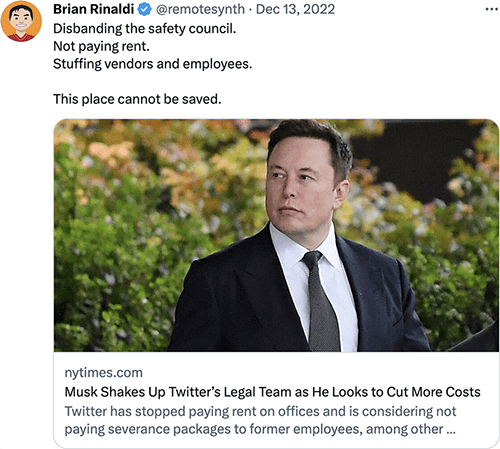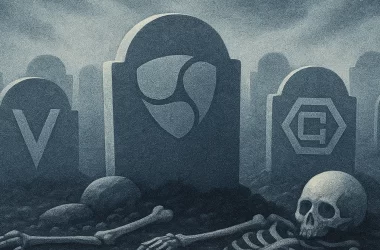I’ve been in DevRel(ish) roles since 2010. The idea of developer relations was pretty new back then and only a handful of companies even had DevRel roles. But what we did have at the time was Twitter.
I joined in June 2007, shortly after it became an independent company. When I was first introduced to Twitter, the idea seemed silly. Long-form blogging was in. What was the point of these short posts where I couldn’t say much with substance?
What sold me on it ultimately was that there was a fast growing developer community on there. Soon I was connected with a ton of developers and joining in conversations on the topics of code and careers. Over the years I made a lot of amazing connections via Twitter. Some folks I have met on Twitter have eventually become IRL friends. However, it was also an invaluable tool as a Developer Advocate and Community Manager. If you wanted to reach the developer community (at least in much of the world, if not all of it), Twitter was the place to be.
Twitter’s importance to DevRel
Let’s be honest, up front – Twitter could often be an echo chamber. That being said, it played an important role in the careers of many folks in DevRel, including mine. In my case, this was not because I had a huge audience (I had a decent following but never huge), but because of its outsized role in the developer community.
Twitter was the place to:
- Get the pulse of the developer community. Part of our role as DevRel is to help the company stay on top of trends in the developer community, and Twitter was the best place to do this.
- Promote content and awareness. Whether it was your blog post, video, conference talk or event, Twitter was the easiest and cheapest (assuming you didn’t pay for promotion) way to build awareness in the developer community.
- Make connections. Twitter was often the easiest way to find and connect with developers at a company, a conference or to find speakers for an event.
Each of these activities play an important role in doing the job of developer relations. Twitter was a key piece to the aspects of the role that involved building awareness and building community.
The great collapse
I don’t need to tell you what happened to Twitter. Honestly, I’m tired of reading about you know who. But, suffice it to say, while Twitter isn’t dead (yet), things kind of fell apart.
On a personal level, I stopped using Twitter. My final tweet in December:
If we’re being honest, things on that site and with that company only got worse from there.
Let me be clear that I am not judging anyone who stayed and who remains active. We all get to make these choices for ourselves and, in fact, this post is largely about how difficult a decision that can be professionally. To me, creating content, whether in the form of blog posts or tweets, has value and I could not continue to give that to the benefit of someone who is not in line with my personal values (similar reason I quit Facebook back in 2016).
Nonetheless, I’ll admit that I didn’t delete my account. I have over a decade worth of connections on there and losing access to DMs on Twitter was a price I was unwilling to pay just yet.
On a more general level, activity on Twitter, while certainly not dead, seemed way off its peak even back in December and engagement in tweets seemed even worse. I have no way to gauge it right now, but most folks I’ve talked to about it seem to imply that this remains fairly accurate. Even if it is still probably the most one of the most active places to engage developers, a large chunk of the audience appears to have left for places like Mastodon, LinkedIn and other venues. Even my occassional use of DMs shows has shown that there are many folks like myself who, even if their account is still active, very infrequently come back only to check messages.
The cost/benefit of losing Twitter
To answer the question I posed in the title of this post, of course you can do DevRel effectively without Twitter. That doesn’t mean there aren’t costs to dropping it.
If you had a sizable audience already on Twitter, you’ll see reduced audience and awareness to your content, including your whatever messages you are amplifying for your employer. Depending on your role, the audience on Twitter may or may not be important. In my current role, it’s importance is minimal but I have seen awareness of some of my personal projects, such as the events I run, so if my livelihood depended on maintaining that audience, my choice would have been far more difficult.
This last item also points to its impact on your own marketability, especially to companies who may deem the Twitter audience to be important or to your ability to market yourself should you be looking for a new role.
However, there are benefits that can outweigh these costs for some people. Personally, I didn’t realize how much time and mental energy Twitter took from me until I quit using it. This blog is back to life with weekly posts in large part because the time and attention I afforded Twitter can now be redirected (plus it offers a creative outlet that fulfills similar needs for me as Twitter and in a much more fulfilling way). Actually getting back to blogging, has brought some professional benefits as well in terms of my own visibility in the community.
For those gaps blogging doesn’t fulfill, I’ve found Mastodon to be a good replacement. If you are looking for the reach and potential “virality” of Twitter, you won’t find it there, but you will find an active and growing developer community. It will require less of your time and dedication, which can be a positive, while still bringing good interaction (personally, I post less frequently but tend to get more interaction in the form of replies than I did on Twitter). For better or worse (I think for better), it’s not Twitter.
Others I’ve spoken to have found that LinkedIn can offer them some (or all) of the awareness they’d once found on Twitter. Your mileage may vary on either Mastodon or LinkedIn, but there are other platforms that can potentially help fill that bird-shaped hole in your DevRel career.






